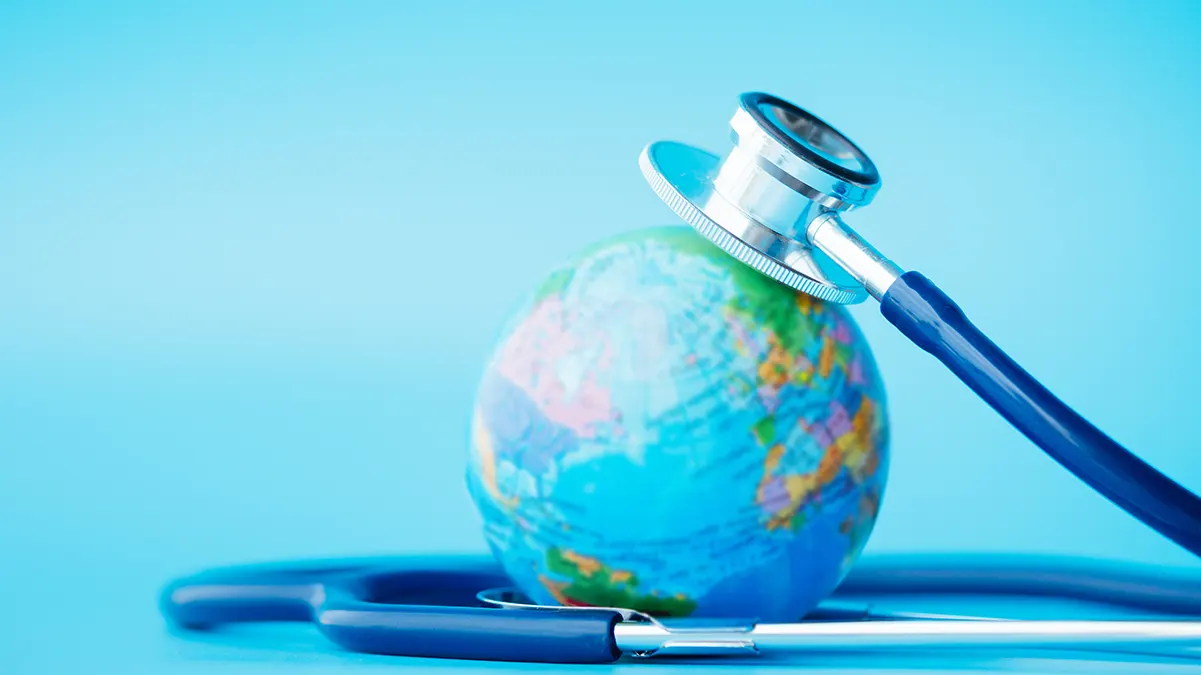Last Updated on August 24, 2023 by Laura Turner
Many aspiring health professionals are attracted to opportunities that impact health outside the nation’s boundaries, but they find limited advice on preparing for a career in global health. In this article, Dr. Chris Kurian and Dr. Azim Khan detail the importance of global cultural competency for students seeking to serve as health professionals.
In today’s highly interconnected, globalizing world, impacts are not confined to national boundaries. The HIV/AIDS pandemic, SARS, and most recently, COVID-19 have driven the importance of addressing healthcare issues globally.
The uneven pace of development and the unequal movement of money, people, goods, and technologies across countries have translated into growing health disparities worldwide, including migration-related health problems, new infectious and lifestyle diseases, and mental health challenges. Health crises contribute to economic downturns and exacerbate the effects of conflict and climate change, with the costs borne disproportionately by the most vulnerable.
We present the benefits of global health education for aspiring health professionals who want to make a local, regional, national, or international impact on significant health challenges.
What is global health?
Global health makes sense of the patterns of existing and emerging health problems across time and the globe, understanding their determinants and assessing their impacts on health, quality of life, morbidity, mortality, and societies and economies. Planning and implementing impactful global solutions requires mobilizing financial commitments to develop frameworks, institutional and programmatic strategies, governance mechanisms, policies, and regulations that span sectors beyond health and healthcare systems.
Why doctors in global health?
Doctors who care about social justice and health equity can help design more equitable healthcare systems. Physicians can frame epidemiological priorities in a multidisciplinary global health team with programmatic, operational, and financial sustainability questions. In their global health education, doctors learn and act in three distinct, interrelated aspects of health systems: service and program delivery, research, and policy.
Students exposed to different healthcare systems are more likely to develop the skills and knowledge needed to be effective physicians. Joel Burt-Miller, a rising medical student, studied community health and social policy in South Africa (through an SIT program). He says, “Studying global health has broadened my viewpoint and allowed me to see my medical studies from a global perspective. It has also informed the span of the impact I can make as a physician in the future as I seek to dismantle health inequities locally and globally.”
Service and program delivery
Medical students learn from technological innovations and low-cost technologies developed in resource-poor settings. For example:
- Solar-powered primary health care centers in the Indian state of Gujarat reduce electricity expenses and help fight global warming.
- Swasthya Swara is a two-day rural health initiative where traditional healers document the role of traditional health knowledge, science, and its current relevance.
- Organic farming can alleviate community health problems.
Healthcare innovations from developing countries can be used to improve access to care in developed countries. Doctors should consider how effective social systems are in delivering high-quality, cost-effective, inclusive, and respectful care to marginalized communities. Finally, in addition to the experience gained from diverse pathologies and presentation of diseases, global health experience helps doctors become more culturally sensitive with domestic, marginalized communities.
Practical experience and employment opportunities
Study abroad offices organize internships and practicums with non-governmental (NGO) and government organizations like USAID, the UK’s Department for International Development, and multilateral institutions like the UN and the World Health Organization. Through these partnerships, students can work with other clinicians who serve as country managers, technical advisors, or domestic administrators.
Students who work with organizations involved with long-term development or humanitarian relief can gain experience with program development, education and training, monitoring and evaluation, and providing technical assistance or clinical and surgical services. Clinical experience in hospitals and healthcare institutions adds value to students’ applications and motivations to pursue global health education. Internships can help doctors to propose and evaluate policies that improve healthcare access and equity.
Research
Many global health programs offer graduate degrees for completing a supervised capstone project. Students can work in infectious disease field labs or humanitarian and international clinical interventions by organizations like Médecins sans Frontières.
Rather than just looking at how well a therapeutic intervention changes morbidity or mortality, students with a global health focus learn to evaluate real-world effectiveness and sustainability (Nelson et al., 2012). Local research can be conducted with a worldwide perspective to learn from other countries and adapt successful solutions to local needs. Finally, research projects can document best practices for marginalized patients and develop innovations to improve equity and access to inclusive, respectful care (Chen et al., 2020).
The School for International Training (SIT) is an original training institution for Peace Corps volunteers and offers 80+ study abroad programs for undergraduate and graduate students. This article is provided without financial conflicts of interest or other relationships to disclose with HPSA/SDN.
The Google Bard chatbot was used to edit this article as drafted in July 2023.
References
Chen X, Li H, Lucero-Prisno DE 3rd, Abdullah AS, Huang J, Laurence C, Liang X, Ma Z, Mao Z, Ren R, Wu S, Wang N, Wang P, Wang T, Yan H, Zou Y. (2020 April) What is global health? Key concepts and clarification of misperceptions: Report of the 2019 GHRP editorial meeting. Global Health Research Policy. 7;5:14.
Nelson, B.D., Kasper, J., Hibberd, P.L. Thea, D.M., Herlihy, J.M. (Sep 2012) Developing a Career in Global Health: Considerations for Physicians-in-Training and Academic Mentors. Journal of Graduate Medical Education. 4(3): 301–306.
Chris M Kurian is faculty with SIT’s MA in Global Health and the undergraduate program in Public Health, Gender, and Community Action of the School of International Training.



